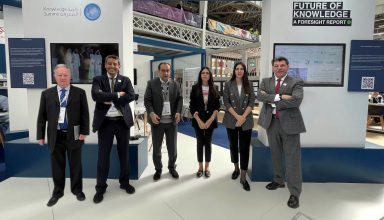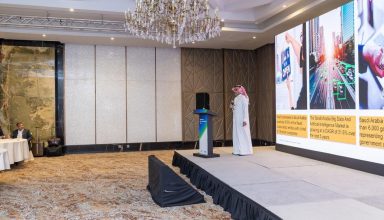MBRF successfully concludes participation at London International Book Fair

Mohammed bin Rashid Al Maktoum Knowledge Foundation (MBRF) successfully concluded its participation at the London International Book Fair, one of the world’s largest books fairs, which was held from April 18 to 20, 2023. MBRF centered on various activities that highlighted its knowledge projects and initiative globally.
His Excellency Jamal bin Huwaireb, CEO of MBRF, said: “The London International Book Fair offered a significant platform for interaction with global partners and stakeholders in the sectors of science, culture, and knowledge. The event gave us a special opportunity to strengthen our position as a preeminent institution in the knowledge sector and to increase our collaborations and connections with the most significant knowledge industry figures globally.”
Bin Huwaireb emphasised the significance of attending and taking part in global exhibitions and forums that offer an opportunity to share experiences, strengthen relationships with key figures in the culture and knowledge industries, stay updated on the most recent knowledge trends, and attract attention to the significant contributions that MBRF makes to promoting knowledge both within and outside of the UAE.
On the final day of the event, MBRF featured a variety of activities, discussions, and events. His Excellency Mansoor Abdullah Abulhoul, UAE ambassador to the United Kingdom, as well as a group from the Trends Research and Advisory visited the MBRF’s stand at the exhibition and learned about the organisation’s ideas, programmes, and projects.
MBRF hosted a discussion session titled ‘Engaging Fans 2.0: Innovations and Ethics’, as part of the Know Talks series, on the final day of the event. Journalist Layla Maghribi was the session’s host and she spoke about podcasting and the opportunities it provides to people and organisations to monetise audio content and reach a broad audience.
Maghribi affirmed that engagement with the audience is a crucial component of the podcast’s success and that it can be sustained and enhanced through innovation and adherence to certain ethical principles. She emphasised that basic equipment like computers, microphones, and editing software are needed to create podcasts, but as the industry develops, it will be feasible to upgrade recording equipment to produce better audio.
Maghribi clarified that the content might be text or video and could include questions, comments, polls, lessons, quotes from podcasts, and messages of encouragement from the audience. She outlined the need to take precautions to preserve the truthfulness and integrity of the content and against sending incorrect information. She also warned against consuming high-quality content that contains inaccurate or deceptive information.
Maghribi emphasised the need to pay attention to the audience and not ignore them, regardless of how many listeners there are, and to make sure that they meet their interests and communicate with them to improve the quality of the content and enhance the podcast, confirming the importance of making sure that content is not appropriate for children or content that is offensive to children.
The Dubai International Programme for Writing’s ‘Scientific Translation… Prospects and Future’ panel discussion was also organised by MBRF. Dr. Ghanem Al-Samarrai, Associate Professor of Comparative Literature and Translation at the University of Sharjah, spoke on the panel on the significance of scientific translation, which calls for expertise beyond simple translation and necessitates a thorough knowledge of both the subject matter being translated and the subject matter itself.
Al-Samarrai emphasised the significance of localisation in scientific translation, expressed the need to use clear, understandable language for the translated text, the significance of preserving all information and not reducing it, the necessity of eradicating cultural conflicts between two languages, and the need to disseminate translated terms among the public through newspapers and newsletters.
Al-Samarrai referred to the disagreement among certain translators over the localisation technique, how crucial it is to accurately reflect the original texts’ meanings, and the potential use of other strategies to accomplish this purpose. He further emphasised the necessity to concentrate on the value of the traditional Arabic language, its usefulness, and its use as an explanation when phrases are unclear.
Al-Samarrai emphasised that the translator must be an expert in the field he is translating into and be familiar with the scientific terminology used in this field in order for the translation to be a reliable source of scientific information and that errors and incorrect translations that could cause misunderstanding and confusion of information should be avoided.
Al-Samarrai further said that there should be access to scientific sources for translation and that specialists in the subject need to be consulted, whenever required. He also highlighted that vigilance is necessary so that appropriate terms are used in the scientific field and avoid using new terms that have not yet become common, further highlighting the need for reviewing the translation after it has been completed to ensure that there are no spelling, grammatical, or other linguistic errors, as well as the requirement to giving new translators the required training to develop their skills in scientific translation.
A panel discussion was also organised by MBRF as part of a ‘Knowledge Lounge.’ The discussion of “Identity Smell and the Modern History of Dubai – Spice Circle novel”, was held in the presence of critic Haitham Hussein, who interacted with the participants.
During the three-day London International Book Fair, MBRF’s pavilion witnessed numerous visitors, along with organising a series of knowledge activities and events that included dialogue sessions, discussion panels, workshops, and intellectual and student meetings.
[email protected] source: biztoday
